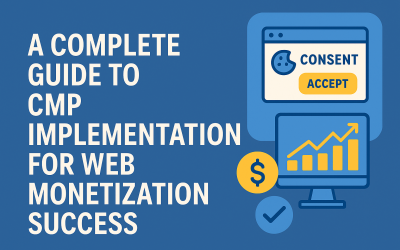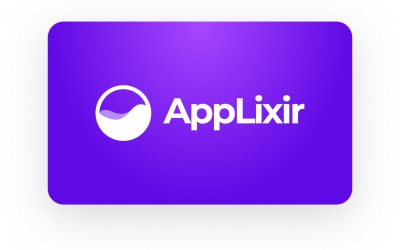Contents
- 1 Navigating Google’s New Consent Management Protocol: A Simplified Guide
- 1.1 Section 1: Understanding Google’s CMP Requirements
- 1.2 Section 2: Key Features of CMP
- 1.3 Section 3: Implementing CMP
- 1.4 Section 4: CMP’s Impact on Rewarded Video Ad Monetization and Analytics
- 1.5 Section 5: The User Perspective
- 1.6 Section 6: Post CMP Enforcement on Jan 16th
- 1.7 Section 7: AppLixir and Consent Management Platform
Google’s new Consent Management Protocol (CMP) is a new initiative addressing the ever-evolving Privacy related regulations, particularly GDPR and CCPA. It’s vital for both web users and site owners to understand the implications of CMP.
I have covered CMP in my past Blog posts but this will give readers a comprehensive guide on what to expect Post January 14th. [ez-toc]
Section 1: Understanding Google’s CMP Requirements
Google’s CMP is a framework aimed at standardizing how online consent is managed across websites. As I mentioned above, it’s a response to growing demands for data privacy worldwide. CMP serves as a mediator, ensuring that websites adhere to legal standards like GDPR and CCPA when collecting user data. This system simplifies the process for users to grant or deny consent for their data usage, making the web a more transparent space.
Section 2: Key Features of CMP
The CMP focuses on enhancing user privacy by including a clear and concise consent request, an easy-to-navigate interface for users to manage their data preferences, and strict adherence to user consent decisions. For businesses, CMP necessitates a shift in how they handle user data – with a greater emphasis on obtaining clear consent before collecting or using personal information. These features not only boost user confidence but also elevate the ethical standards of online businesses.
Section 3: Implementing CMP
Implementing CMP is a crucial step for website owners. It involves integrating a system that clearly communicates with users about the data being collected and the purpose behind it. Transparency is key. The consent mechanism should be straightforward, allowing users to make informed decisions easily. Non-compliance with CMP can lead to legal repercussions, making it imperative for businesses to understand and correctly implement these protocols.
Section 4: CMP’s Impact on Rewarded Video Ad Monetization and Analytics
CMP significantly impacts the realms of digital advertising and data analytics. For advertisers, the challenge lies in navigating the new landscape where user consent dictates data availability. It requires a more nuanced approach to targeting and personalization. In terms of analytics, the focus now is on analyzing data that is gathered with consent, ensuring that insights are derived from ethically sourced information. This shift may seem restrictive, but it opens up avenues for more transparent and trust-based marketing strategies.

Section 5: The User Perspective
From a user’s standpoint, CMP brings a new level of control and security. It empowers users to have a say in how their personal data is handled online. With CMP, consenting to data collection is no longer a passive process but an active choice. This enhancement in user autonomy not only improves the browsing experience but also fosters a greater sense of trust in the websites that respect their choices.
Section 6: Post CMP Enforcement on Jan 16th
As the January 14 deadline approaches for the implementation of Google’s Consent Management Protocol (CMP), there are several key changes and expectations that users and website owners should prepare for. For website visitors, the most noticeable change will be the way websites ask for consent regarding data collection and usage. The CMP will standardize these consent requests, making them more transparent and easier to understand. Users can expect a clearer understanding of what data is being collected and for what purpose, as well as a more straightforward process for granting or denying consent. This user-centric approach not only enhances privacy but also empowers individuals to make informed decisions about their online data.
For website owners and digital businesses, the implementation of CMP marks a significant shift in how they interact with user data. They will need to ensure that their websites are fully compliant with the new protocol, which means integrating a system that clearly and accurately communicates with users about data practices. Compliance is not optional, as failure to adhere to the CMP standards can result in legal and financial repercussions. Additionally, the digital advertising landscape is set to undergo changes. Advertisers will have to adapt to a new environment where user consent plays a crucial role in shaping marketing strategies. Overall, the post-January 14 era will be characterized by heightened transparency, increased user control over personal data, and a more ethical approach to data collection and usage in the digital realm.
Section 7: AppLixir and Consent Management Platform
As Google’s implementation of the Consent Management Protocol (CMP) on January 14 approaches, it heralds significant changes for users and website owners alike. For users, this transition means a more transparent and controlled digital experience. Consent requests for data collection will become more standardized and user-friendly, allowing individuals to make informed decisions about their online privacy. This shift not only enhances user autonomy but also fosters a more trust-based relationship between users and digital platforms.
In this new landscape, website owners face the critical task of ensuring their sites are CMP-compliant. This is where AppLixir steps in as an invaluable ally. We at AppLixir, are ready to assist you while transitioning to this new requirment. They offer tools and services designed to align websites with CMP requirements, ensuring that consent mechanisms are both transparent and user-friendly. AppLixir’s solutions are tailored to simplify compliance, reducing the legal risks and complexities associated with the new protocol. For digital advertisers, AppLixir also provides strategies and insights to adapt to a consent-based marketing environment, helping businesses to maintain effective customer engagement while respecting user choices. Overall, AppLixir’s role in this transition is pivotal, offering the necessary support and guidance for websites to thrive in a post-CMP implementation world.




